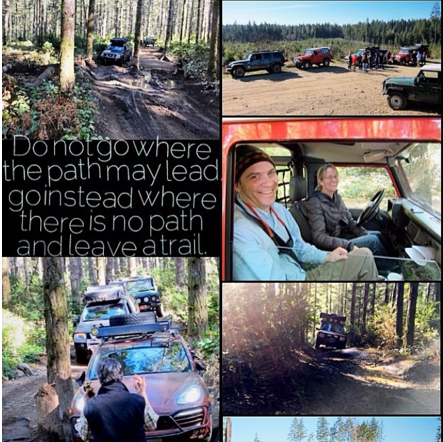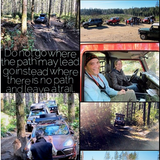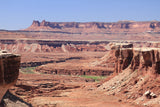REMOTE CAMP EVENT in Moab Utah -
Defenders Northwest is running our late winter training class off-site this year in conjunction with a follow-me trip in the canyons of SE Utah. This special OR101 training session includes the basic Off-Pavement theory and practical operator training, as well as an introduction to remote winter camping and navigation.
Training includes:
- One-half day of outdoor classroom training with materials
- One-half day of behind the wheel training with instructors
- Take-away notes and swag-bag
Following the single day course, participants are welcome to follow us along on a 3-day camping trip in the high desert canyons and mesas of SE Utah.
Participants must have a street legal off-pavement capable vehicle with adequate traction tires along with winter camping equipment. A list of minimum requirements and suggested equipment is available on request.
Our basic offroad training program focuses on safe and capable operation on poor condition roads & trails, vehicle limitations / condition, self recovery, vehicle equipment preparation, emergency operation, trailside repair techniques, and navigational skills. This is not the advanced expedition course – the focus is on building a foundation of skills in reading terrain and conditions, knowing your vehicle capabilities and limits, risk assessment and its application. Our objective is to teach participants confident and skilled situational assessment skills – knowing what it would take to get through an obstacle, knowing what you and your vehicle can do, analyzing the risks and options in order to make prudent decisions – basic recovery skills are taught so that the planning can take into consideration what would be needed when things don’t go as planned.
Unlike recreational “wheeling” this course is not designed to encourage the driver push the vehicle to it’s limits – the training is geared toward learning both the drivers’ and vehicles capabilities and choosing to stay well within the capability zone of both – when traveling overland and an obstacle is encountered a skillful operator will be able to asses the risks in overcoming the obstacle and weigh those risks with the availability of other options. Where there is a low risk work around solution to a moderate or high risk obstacle the overland traveler will protect the integrity of the vehicle and choose the lower impact solution. As such we are teaching and practicing those skills of how to approach and pass-through obstacles one may encounter on a forest road or in areas serviced by non-paved roads of varying conditions.
Our travel event course is run in a single long day -
The classroom session will consist of a day of theory and practical considerations with the instructors in a group class setting to encourage cooperative problem solving and creative analysis. Throughout the course we emphasize safety and situational awareness. Following a lunch break the classroom session has the group perfoming some cone work to emphasize vehicle positioning and capabilities in a controlled setting.
We cover:
- Approach angles
- Departure angles
- Break over angles
- Rough ground driving
- Soft ground driving
- Up-hill techniques & crossing ridges
- Down-hill techniques & failed hill-climb management
- Over-obstacle – axle and tire placement
- Sidehill techniques
- Gully and washout techniques
- Wading
- Basic recovery tools & techniques
The course includes a half day of classroom/theory and a half day of applied activities to put the classroom training into practice.
You don't have to have a Defender to participate - though our training program was developed with a Defender focus it is applicable to all makes and models of off-road capable cars, trucks, and SUV. Requirements are an approved of-pavement ready vehicle vehicle (a stock 4×4 in trail ready condition is sufficient please contact us if you are uncertain), off-pavement tires with good tread life remaining, current automobile road insurance, appropriate clothing, hand and foot protection, and a readiness to learn while having fun.
Participants are required to complete a liability waiver and provide proof of insurance.
If you are solo or the primary driver in the course please select the Primary Driver option during registration
For a second driver or passenger sharing a vehicle please select the Passenger registration - you must identify your primary driver in order to register as a passenger. For clarity in training and the most effective use of time we request that there be no more than two participants per vehicle. Class reservation is per individual and space is very limited due to the hands-on nature of the class – Passenger participation includes full training information if driver and passenger arrangement allows, and the passenger meets the basic course requirements (+16yo with full license for driving training)
We have received some excellent feedback from the previous courses!
What did you like most about the Basic Off-Pavement driving class?
"It's nice to talk to others who understand the vehicle. I had previously only taken it out on forest service roads, so getting it out on actual trails, with a bunch of knowledgeable people around, relieved the anxiety of going off road for the first time."
"EVERYTHING! I just loved it. I appreciate the approach - slow, deliberate, search for the solution. I appreciate how it was not meant to frighten, but to empower."
What do you think is the most important thing you learned in this course?
"The cone work really helped me tremendously on day 2. There was one group of trees that was exactly like the cone “tree” test and I just drove through it like nothing. I now have a much better understanding of where my “pumpkin” is and less fear of smashing it. I also understand that I have no real idea where the passenger side of my D90 is."
"I don't think it was one specific thing, but rather I gained the confidence to take my vehicle further off paved road"


